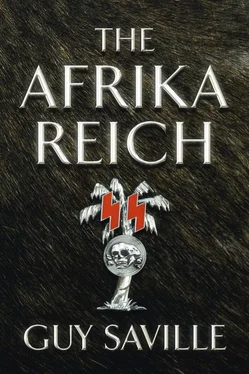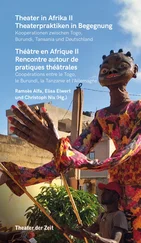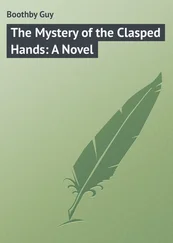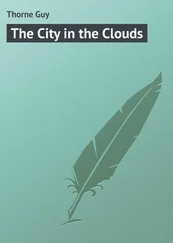Hochburg took the case, placed the key from his neck into the left-hand lock and gave it a sharp turn, like breaking a mouse’s neck. The mechanism pinged. He swivelled the case back. Burton inserted his own key into the second lock. Another ping. He lifted the top and slid his hand in, finding the bag of diamonds. He took it out, the knife still hidden inside the pouch, and stared at Hochburg. Hochburg looked back. A stalemate of unblinking eyes.
Ask , a voice was bellowing in Burton’s head; it might have been his father’s. What are you waiting for? Ask!
But still he said nothing. He didn’t know why. The room felt as hot as a furnace, Burton aware of the sweat soaking his collar.
Opposite him, Hochburg shifted a fraction, clearly not used to such insubordination. He ran a hand over his bald head. There was not a drop of perspiration on it. In the silence Burton caught the prickle of palm against stubbly scalp. So not bald, shaved. Any other time he might have laughed. Only Hochburg possessed the arrogance to believe his face needed something to make it more intimidating.
Burton’s fingers curled around the handle of the knife. Very slowly he withdrew it from the pouch, all the while keeping it out of sight.
Hochburg blinked, then leaned forward. Held out a grasping claw. ‘My diamonds, Sturmbannführer.’ He offered no threat, yet there was confusion in his eyes.
Burton spoke in English, his mother’s language; it seemed the most appropriate. ‘You have no idea who I am, do you?’
Hochburg’s brow creased as if he were unfamiliar with the tongue.
‘Do you?’
‘ Was? ’ said Hochburg. ‘Ich habe nicht verstanden. ’ What? I don’t understand.
In those restless nights before the mission Burton’s greatest anxiety was that Hochburg might recognise him. It was twenty years since they’d last seen each other but he feared that the boy he’d been would shine through his face. Throughout their whole meeting, however, even with their eyes boring into each other, there hadn’t been the slightest tremble of recognition.
Now something was creeping into Hochburg’s face. Realisation. Alarm. Burton couldn’t decipher it. Hochburg glanced at the portrait of Hitler as if the Führer himself might offer a word of explanation.
Burton repeated his question, this time in German, revealed the knife as he spoke. The blade caught the lamplight for an instant – a blink of silver – then became dull again. ‘My name is Burton Cole. Burton Kohl. Does it mean anything to you?’
The faintest shake of the head. Another glimpse towards the Führer.
‘My father was Heinrich Kohl. My mother—’ even after all this time her name stumbled in his throat ‘—my mother, Eleanor.’
Still that blank look. Those empty brown eyes.
If the bastard had hawked their names and spat, if he had laughed, Burton would have relished it. But Hochburg’s indifference was complete. The lives of Burton’s parents meant no more to him than those pitiful, nameless skulls on the square outside.
He had planned to do it silently so as not to bring the guards hammering at the door. But now he didn’t care.
Burton leapt across the table in a frenzy.
He crashed into Hochburg, hitting the bottle of water. Shards of it exploded everywhere. Burton grabbed the older man’s throat but Hochburg was faster. He parried him with his forearm.
They both tumbled to the ground, limbs thrashing.
Hochburg swiped ferociously again, snatched at Burton’s ear as if he would rip it off. Then he was grasping for his Luger.
Burton clambered on top of him. Pushed down with all his weight. Pointed the knife at his throat. Hochburg writhed beneath him. Burton slammed his knee into his groin. He felt the satisfying crush of testes. Veins bulged in Hochburg’s face.
Outside the room there was shouting, the scrape of boots. Then a tentative knock at the door. It locked from the inside and no one was allowed entry without the express command of the Oberstgruppenführer, even the Leibwache – Hochburg’s personal bodyguards. Another detail Ackerman had supplied.
‘You recognise this knife,’ hissed Burton. All his teeth were bared. ‘You used it often enough. Fattening yourself at our table.’ He pushed the blade tight against Hochburg’s windpipe.
‘Whoever you are, listen to me,’ said Hochburg, his eyeballs ready to burst. ‘Only the Führer’s palace has more guards. You can’t possibly escape.’
Burton pushed harder, saw the first prick of blood. ‘Then I’ve got nothing to lose.’
There was another knock at the door, more urgent this time.
Burton saw Hochburg glance at it. ‘Make a sound,’ he said, ‘and I swear I’ll cut your fucking tongue off.’ Then: ‘My mother. I want to know. I…’ He opened his mouth to speak again, but the words died. It was as if all Burton’s questions – like wreaths or phantoms – had woven themselves into a thick cord and pulled tight around his throat. He made a choking sound and became deathly still. The blade slackened on Hochburg’s neck.
Then the one thing happened that he never considered.
Burton began to weep.
Softly. With no tears. His chest shuddering like a child’s.
Hochburg looked more bewildered than ever but took his chance. ‘Break down the door!’ he shouted to the guards outside. ‘Break down the door. An assassin!’
There was a frantic thump-thump-thump of boots against wood.
The sound roused Burton. He had never expected to get this opportunity; only a fool would waste it. He bent lower, tear ducts still smarting. ‘What happened to her?’
‘Quickly,’ screeched Hochburg.
‘Tell me, damn you! I want the truth.’
‘Quickly!’
‘Tell me.’ But the rage and shame and fear – and in the back of his mind the training, that rowdy instinct to survive – suddenly came to the fore.
Burton plunged the knife deep and hard.
Hochburg made a wet belching noise, his eyelids flickering. Blood spurted out of his neck. It hit Burton in the face, a slap from chin to eyebrow, geysered on to the walls. Burning hot. Scarlet.
Burton stabbed again and again. More blood. It drenched his clothes. Spattered the maps on the walls, running down them. Turning Africa red.
Then the door burst inwards and two guards were in the room, pistols drawn. Faces wide and merciless.
Chapter Two

IT was called dambe . Burton had learned it as a kid on the banks of the River Oti, in Togo, taught by the orphans his parents were supposed to redeem. Learning to kick and punch and headbutt with the unbridled ferocity of a fourteen-year-old. But always at night, always away from Father’s soulless eyes. Inventing excuses for the splits and swellings that blotted his face. Soon he was beating the boys who instructed him. They said he had the yunwa for it – the hunger. That was after his mother had left them.
The Leibwache glanced down at Hochburg, their mouths sagging with disbelief. Blood continued to gush from his throat, weaker with each spurt.
Burton sprang up. Three strides and he was at the door, his left hand held out in front of him straight as a spade, the right curled into a ball of knuckles tight at his armpit, legs bent like a fencer.
He stamped his boot down on the closest Leibwache’s shin. The man buckled as Burton lunged forward and – snap – fired his fist into his face. A headbutt and the guard was rolling on the floor.
The second Leibwache spun his pistol at Burton and fired, the shot missing his head by a fraction. Burton felt his eardrum thunderclap and muffle at the closeness of the bullet. Oblivious to it, he twisted low and rammed his elbow into the Leibwache’s chest-bone. The guard doubled up, his pistol skittering across the floor.
Читать дальше













